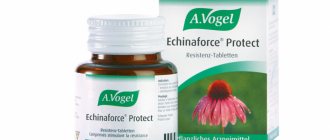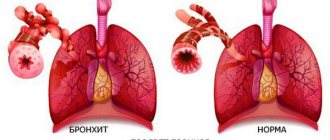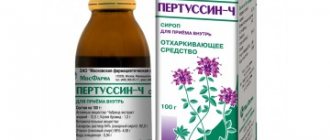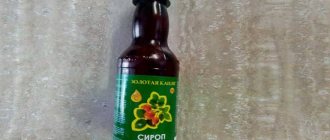Compound
1 milliliter of syrup contains:
- fenspiride hydrochloride – 2 milligrams (active ingredient);
- methyl parahydroxybenzoate (E 218) – 0.9 milligrams;
- propyl parahydroxybenzoate (E 216) – 0.35 milligrams;
- vanilla flavoring – 4 milligrams;
- glycerol (E 422) – 22.5 milligrams;
- sunset yellow dye (E 110) – 0.1 milligrams;
- sucrose – 600 milligrams;
- potassium sorbate (E 202) – 1.9 milligrams;
- honey flavoring – 2.5 milligrams;
- sodium saccharinate (E 954) – 0.45 milligrams;
- citric acid monohydrate (E 330) – 0.2 milligrams;
- purified water - up to 1 milliliter.
Content
- Characteristics of Siresp (syrup 2m/ml fl. 150ml)
Composition: 150 ml bottle Fenspiride hydrochloride 2 mg per 1 ml.
Excipients: methyl parahydroxybenzoate, propyl parahydroxybenzoate, potassium sorbate, glycerol, sodium saccharinate, sucrose, orange flavor or raspberry flavor, citric acid monohydrate, purified water.
Syrup in the form of a clear liquid from colorless to yellow, with an orange or raspberry smell.
Opalescence is acceptable.
Pharmacological Action: Fenspiride exhibits anti-inflammatory and antibronchoconstrictor activity by reducing the production of a number of biologically active substances (cytokines (especially TNF?), arachidonic acid derivatives, free radicals), which play an important role in the development of inflammation and bronchospasm.
Inhibition of arachidonic acid metabolism by fenspiride is potentiated by blockade of histamine H1 receptors, i.e.
To.
histamine stimulates the metabolism of arachidonic acid with the formation of prostaglandins and leukotrienes.
Fenspiride blocks β-adrenergic receptors, the stimulation of which is accompanied by an increase in the secretion of the bronchial glands.
Thus, fenspiride reduces the effect of a number of factors that contribute to the hypersecretion of proinflammatory factors, the development of inflammation and bronchial obstruction.
Fenspiride also has an antispasmodic effect.
Indications for Use: Symptomatic treatment of diseases of the upper and lower respiratory tract: - nasopharyngitis and laryngitis; - tracheobronchitis; - bronchitis (with or without chronic respiratory failure); - bronchial asthma (as part of complex therapy); - respiratory phenomena (cough). , hoarseness, sore throat) with measles, whooping cough and influenza; - infectious diseases of the respiratory tract accompanied by cough, when standard antibiotic therapy is indicated.
Otitis and sinusitis of various etiologies, including allergic (both seasonal and permanent).
Method of Administration: The drug is taken orally, before meals.
For children over 2 years of age, the drug is prescribed at a dose of 4 mg/kg/day.
Children weighing up to 10 kg - from 2 to 4 dosage spoons of syrup (10-20 ml)/day, can be added to the bottle with food; children weighing more than 10 kg - from 6 to 12 dosage spoons of syrup (from 2 to 4 tablespoons or 30-60 ml)/day.
Adults are prescribed from 9 to 18 dosage spoons of syrup (from 3 to 6 tablespoons or 45-90 ml)/day.
1 dispenser spoon (5 ml of syrup) contains 10 mg of fenspiride hydrochloride and 3 g of sucrose.
1 tablespoon (15 ml of syrup) contains 30 mg of fenspiride hydrochloride and 9 g of sucrose.
The duration of treatment is determined by the doctor.
Interaction: Special studies on the interaction of fenspiride with other drugs have not been conducted.
Due to the possible enhancement of the sedative effect when taking histamine H1 receptor blockers, the use of Siresp in combination with drugs that have a sedative effect or with ethanol is not recommended.
Side Effects: The following side effects are listed in accordance with the frequency of occurrence: very often (? 1/10); often (?1/100,
Indications for use
Treatment of symptoms of lower and upper respiratory tract diseases:
- chronic bronchitis with respiratory failure;
- respiratory disorders due to whooping cough , influenza , measles ;
- bronchospastic syndrome;
- bronchial asthma;
- sinusitis;
- nasopharyngitis;
- rhinotracheobronchitis;
- otitis;
- laryngitis.
Herbapect syrup bottle 150g No. 1
Name
Herbapect syrup.
Description
The syrup is a dark brown, translucent, thick liquid with an aromatic odor.
Release form
Syrup.
Dosage
150 g.
Indications for use
Traditionally for catarrh of the upper respiratory tract. Painful dry cough. Difficulty expectorating.
Directions for use and doses
The drug is for oral use. Children over 6 years old - 1/2 teaspoon (about 2.5 ml), adults - 1 teaspoon (about 5 ml) 3-4 times a day after meals.
Use during pregnancy and lactation
The drug is not recommended for use during pregnancy.
Precautionary measures
The drug contains sorbitol. Patients who have previously been identified as intolerant to certain types of sugars should consult a doctor before using the drug.
Contraindications
Hypersensitivity to the active or auxiliary substances included in the drug. Asthma. Do not use in children who have suffered from acute laryngitis. Special warnings and precautions for use Due to the ethanol content, it is not recommended for use in children under 6 years of age and in patients with liver disease, epilepsy and alcoholism, as well as in pregnant and breastfeeding women. The syrup does not contain sugar and can be used by patients with diabetes. Pregnant and breastfeeding women should consult a doctor before using the drug. Should not be used in combination with antitussives that impede the removal of sputum.
Compound
Active ingredients: 5 ml of syrup contains 498 mg of liquid thyme extract (Thymi extractum fluidum), 348 mg of primrose tincture (Primulae tinctura), 87 mg of sulfoguaiacol (Sulfoguaiacolum); excipient: non-crystallizing liquid sorbitol.
Overdose
Symptoms of overdose have not yet been described; if they appear, symptomatic treatment should be applied.
Side effect
Due to the content of thyme herb, an allergic reaction (anaphylactic shock, angioedema (Quincke's edema)) may occur. Gastrointestinal disorders: nausea and vomiting.
Storage conditions
Keep the drug out of the reach and sight of children. Do not use Herbapect after the expiration date indicated on the package. Store in original packaging at a temperature not exceeding 25°C. Do not store in the refrigerator. Do not freeze. The drug is dispensed without a doctor's prescription.
Buy Herbapect syrup in bottle 150g per pack. No. 1 in pharmacy
Price for Herbapect syrup in bottle 150g per pack. No. 1
Instructions for use for Herbapect syrup in bottle 150g in pack. No. 1
Instructions for use Sirespa (Method and dosage)
Take the drug orally before meals. The recommended dose is 4 milligrams of fenspiride/kg per day. The dose must be divided into several doses.
Adults and adolescents should take 9-18 scoops of syrup per day (this is 45-90 milliliters of syrup or 90-180 milligrams of fenspiride hydrochloride, respectively).
Siresp syrup, instructions for use for children
- Children under 10 kg should be given 2-4 scoops of syrup per day (this is 10-20 milliliters of syrup or 20-40 milligrams of fenspiride hydrochloride, respectively). Siresp syrup is prescribed for children from two years of age.
- For children weighing more than 10 kg, the dose is 6-12 scoops of syrup (this is 30-60 milliliters of syrup or 60-120 milligrams of fenspiride hydrochloride, respectively).
Siresp 0.2 mg/ml 150 ml syrup
Siresp 0.2 mg/ml 150 ml syrup
Compound. 1 ml of syrup contains: active ingredient: fenspiride hydrochloride 2 mg, excipients: methyl parahydroxybenzoate (E 218), propyl parahydroxybenzoate (E 216), potassium sorbate (E 202); glycerol (E 422), sodium saccharinate (E 954), sucrose, vanilla flavor, honey flavor, orange yellow dye (E 110), citric acid monohydrate (E 330), purified water.
Pharmachologic effect. Fenspiride counteracts bronchoconstriction and has an anti-inflammatory effect. This action is the result of the interaction of various interrelated mechanisms: - antagonistic activity at the level of histamine Hi-receptors and papaverine-like (myotropic) antispasmodic effect; - anti-inflammatory effect is the result of a decrease in the production of various pro-inflammatory factors (cytokines, TNF^a, arachidonic acid derivatives and free radicals), some of which also have a bronchoconstrictor effect. However, these effects were observed only at very high doses or concentrations. After oral administration, the maximum serum concentration of fenspiride is achieved on average from 0.5 hours to 8 hours. The half-life is approximately 12 hours. Fenspiride is excreted mainly through the kidneys.
Indications for use. Symptomatic treatment of respiratory tract diseases (cough and expectoration). Taking this drug should not delay the initiation of antibiotic therapy if necessary.
Contraindications. Hypersensitivity to the active substance and/or to any excipient of the drug. Children under 2 years of age. Siresp contains sucrose, so patients with rare genetic disorders associated with fructose intolerance, poor glucose-galactose absorption syndrome, or sucrase-isomaltase deficiency should not take Siresp.
Pregnancy and lactation period. It is not recommended to take Siresp during pregnancy. There is no data indicating that fenspiride passes into mother's milk, but it is not recommended to take the drug during breastfeeding.
Directions for use and dosage: Take orally before meals. Children over 2 years of age: The usual recommended dose is 4 mg fenspiride hydrochloride/kg per day. Up to 10 kg: 2-4 scoops (or 10-20 ml) Siresp syrup (20-40 mg fenspiride hydrochloride) per day. More than 10 kg: 6-12 scoops (or 30-60 ml) of Siresp syrup (60-120 mg fenspiride hydrochloride) per day, the dose must be divided into several doses. Adults and adolescents: 9-18 scoops (or 45-90 ml) of Siresp syrup per day (90-180 mg of fenspiride hydrochloride) per day, the dose must be divided into several doses. The package includes a measuring spoon with a scale of 1.25 ml, 2.5 ml and 5 ml of syrup. The duration of treatment is determined by the attending physician. 5 ml of syrup contains 10 mg of fenspiride hydrochloride and 3 g of sucrose (equivalent to 0.25 bread units).
Side effect. Cardiac disorders. Rare: moderate tachycardia, which stops when the dosage is reduced. From the digestive system. Common: nausea, stomach pain, gastrointestinal disorders. Unknown: diarrhea, vomiting. Allergic reactions. Rarely: erythema, angioedema, fixed erythema pigmentosa, rash; Due to the presence of para-hydroxybenzoate in the syrup, urticaria may develop. Nervous system disorders. Rare: drowsiness. Unknown: dizziness. Any side (unusual) effects, including those not listed in the package insert, should be reported to your doctor.
Overdose. In case of overdose, the following may occur: drowsiness or agitation, nausea, vomiting, tachycardia. Treatment: gastric lavage, ECG monitoring. Interaction with other medicinal products The interaction of fenspiride with other medicinal products is unknown. However, taking into account the antihistamine effect of fenspiride, one can expect interaction with: - barbiturates - other antihistamines, analgesics, narcotics, sedatives, MAO inhibitors, alcohol.
Features of application. If the disease is infectious, treatment with Siresp is carried out along with standard antibiotic therapy. The drug may cause allergic reactions (delayed reactions are possible) due to the content of preservatives - methyl and propyl parahydroxybenzoate. 5 ml of syrup contains 3 g of sucrose, which must be taken into account when prescribing it to patients with diabetes. The medicinal product contains sunset yellow dye, which can cause allergic reactions (delayed reactions are possible). Influence on the ability to drive vehicles and operate machinery. No studies have been conducted on the effects of Siresp syrup on the ability to drive vehicles and operate machinery.
Release form: 150 ml of syrup in dark plastic bottles, sealed with a polyethylene screw cap with a guarantee ring. The bottle with the leaflet and measuring spoon is placed in a cardboard box.
Storage conditions. In original packaging to protect from light at temperatures not exceeding 25°C. Keep out of the reach of children. Shelf life: 3 years.
Conditions for dispensing from pharmacies. On prescription.
Analogs
Level 4 ATC code matches: Daxas
Inspiron
Erespal
Siresp and Erespal have almost the same composition, so they are considered the most famous analogues of each other. Often people are faced with a choice: buy Siresp or Erespal ? The difference between Sirespa and Erespal is that the first contains dyes and other additives that make it more palatable, while Erespal contains honey and other natural ingredients.



